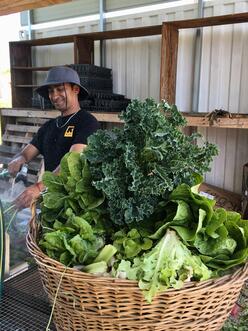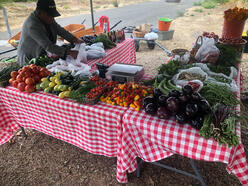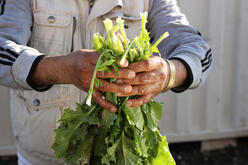By Lonny Shavelson, IRC Online Content Volunteer
Many IRC clients are expert farmers. From their homelands to years in refugee camps, they’ve gained unique knowledge in producing high-yield harvests from small plots of land. Now, through the IRC’s New Roots programs throughout Northern California, refugees, asylees and other special immigrants are renewing these skills locally in community-shared gardens. The programs in Sacramento, Oakland and Turlock each have distinct features.
Sacramento

The New Roots farming and gardening program at the IRC in Sacramento was activated in Bhutan, matured in Nepalese refugee camps, and came to wisdom at a Sacramento Burger King.
“I was resettled by the IRC in Sacramento in 2009,” explained Ram Khatiwoda, who had fled Bhutan at age 10, leaving behind mountainous rain-fed crops of rice, buckwheat, millet, and moringa—the Tree of Life, with edible leaves, fruit for cooking, and roots that taste like horseradish, all rich in calcium and potassium. Which was not what Ram found at Burger King and Jack in the Box.
“When I got a job at a (Rancho Cordova) eyeglass company, I had enough money for restaurants,” he said. But high-calorie Whoppers and fries rapidly expanded Ram’s waistline.“My clothes got smaller,” he joked. “I was getting fat and ruining my health.”
At a refugee community meeting, Ram said, “We came here for a bright future, not to poison ourselves.” The answer, attendees realized, was to start farming again.
In 2014, the IRC in Sacramento found parks and recreation land they could use, communal gardens, and restaurants to buy their produce. Khatiwoda became the Gardening and Marketing Specialist for New Roots in Sacramento and was eventually promoted to Farm Co-Operator last year. The farming program sold more than 28,000 pounds of produce to the Yolo Food Bank last year, as well as nourishing their own refugee families with traditional Afghani gandana (a type of leek), Nepalese hot chilies and black-eyed peas for Iraqi dishes.
Oakland

An IRC New Roots program is also flourishing in Oakland, a distinctly urban environment compared to the Sacramento region’s rural farming resources.
“The family gardeners are very experienced and self-sufficient,” New Roots Oakland Program Manager Zack Reidman said. “They grow a ton of food for their families. That’s a success story, and they don’t need as much of our attention, so we’ve shifted programmatic focus to the schools.”
At Oakland International High School and Rudsdale Newcomer High School, Zack teaches students with COVID-19-safe virtual field trips to community gardens, Bay Area farms, local restaurants and food banks. “In COVID times, IRC has shifted to address increased food security within the entire community,” Zack said.
They get a monthly delivery of 40,000+ pounds of food from the Alameda County Community Food Bank to Oakland International High School and Rudsdale (where many students are unaccompanied youth). They have developed “Cooking Together Apart” Zoom meals where they cook traditional family recipes together. Recently, the meal was a Mam dish of lightly cooked vegetables on a more-modern tostada.
Turlock

Following the lead from established New Roots programs in Northern California, the IRC in Turlock is starting its own land-sharing relationship with Turlock Community Gardens, a burgeoning nonprofit that was co-founded by IRC staff.
“We’re in the heart of the San Joaquin Valley, the premiere agricultural center of the nation, so what better place to launch this,” said Jonathan Partridge, Volunteer and Donations Coordinator at the IRC in Turlock and a Turlock Community Gardens board director. “We’re starting small and hope to grow it.”
Some of IRC Turlock’s clients—more than 70 percent Afghans, with others from Eritrea, Syria and Iran—are already highly skilled gardeners, so it’s a natural fit. Potential crops could include Askalani melons from Afghanistan’s Kunduz province, with a musky odor and the taste of honey. The melons are already being grown about 30 miles northwest of Turlock in the rural San Joaquin Valley town of Vernalis.
New Roots participants may just succeed with these efforts at Turlock Community Gardens, where the motto is, “To plant a garden is to believe in tomorrow.”